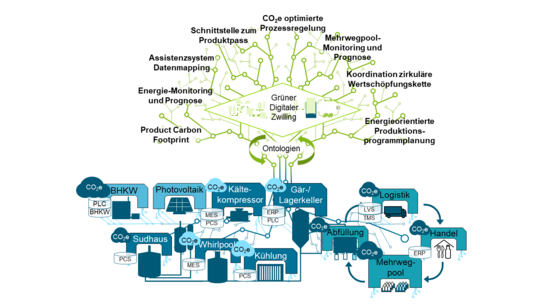BeverGreen
Green digital twin as the basis for the sustainable transformation of the brewing and beverage industry (Project processing ist carried out by RIF e.V., Production Systems Department)
Problem
Climate protection initiatives, new resilience requirements and rising energy and raw material costs require a paradigm shift in manufacturing companies. Digital technologies offer innovative solutions to analyse energy and resource consumption as well as material cycles and to derive data-driven improvements. However, the heterogeneous data storage across process steps, IT systems and value chains makes it difficult to obtain and aggregate data for information extraction.
Objective
The aim of the BeverGreen research project is to develop a green digital twin for analysing and optimising production and logistics from a sustainability perspective. In order to aggregate the data and information, a support system will be developed to map existing data structures (Data Mapping Assistent). The Data Mapping Assistent will create application-specific ontologies with energy-relevant information and integrate external data sets (e.g. on CO2 equivalents (CO2e)) and novel data sources (e.g. retrofitting). The resulting application-specific, semantic data sets form the basis for the green digital twin and its services. With the help of the processed sustainability information and machine learning algorithms, energy and resource saving potentials are identified and realised on the basis of exemplary application scenarios. The project aims to develop and use digital product and process twins for the CO2-neutral transformation of the beverage and brewing industry.

Approach
The joint project will run for three years. It will start with an analysis of the framework conditions in the beverage industry and a explorative study to identify new applications. This will be followed by a structuring of sustainable technologies with the aim of integrating CO2e sources and sinks. In addition, user requirements will be identified and organisational and technical requirements will be defined. Based on the analysis, the green digital twin will be designed and implemented. The results will serve as a basis for further development work and will be validated in the partner companies. The results will be transferred to science and practice.
Research, Development and Application Partners
Funding Reference
This research and development project is/was funded by the Federal Ministry of Economics and Climate Protection (BMWK) in the programme "GreenTech Innovation Competition - Digital Technologies as the Key to the Ecological Transformation of the Economy" (funding code 01MN23008B) and supervised by the DLR project management organisation.


![[Translate to English:] [Translate to English:]](/storages/zentraler_bilderpool/_processed_/2/6/csm_Altes_Maschinenbau-Gebaeude_3a1a87015a.jpg)
![[Translate to English:] [Translate to English:]](/storages/ips-mb/_processed_/a/e/csm_RIFLogo_6e4db96a3c.png)
![[Translate to English:] [Translate to English:]](/storages/ips-mb/r/Forschungsprojekte/99_Archiv/DAAD_Sommerschule/csm_Bitburger_Braugruppe_Logo_1000x849px_11035f5d14.jpg)
![[Translate to English:] [Translate to English:]](/storages/ips-mb/_processed_/b/6/csm_logo-rapidminer-375x86_733f5b43ab.png)
![[Translate to English:] Technische Universität München [Translate to English:] Logo der Technischen Universität München](/storages/ips-mb/_processed_/b/b/csm_technische-universitat-munchen-tum-logo_42163cf76c.png)
![[Translate to English:] daibe.io [Translate to English:] Logo von daibe.io](/storages/ips-mb/_processed_/e/c/csm_daibe_logo_ohne_io.c64ef142_7961603734.png)
![[Translate to English:] PRECOGIT GmbH [Translate to English:] Logo der PRECOGIT GmbH](/storages/ips-mb/_processed_/6/d/csm_cropped-PRECOGIT_Logo_Jan22_RGB_09bd37b948.png)
![[Translate to English:] BMWK [Translate to English:] Logo des BMWK](/storages/ips-mb/_processed_/a/b/csm_Logo_BMWK_de_5f25c5f4a9.png)